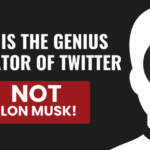Who Created Twitter? Meet the Founders and Explore the Platform’s Origin Story
Twitter began as an internal idea inside a podcasting company called Odeo in early 2006.
The platform was the brainchild of four individuals: Jack Dorsey, Noah Glass, Biz Stone, and Evan Williams.
Their goal was simple—to create a platform where people could share short, real-time updates with others.
Fast forward today, questions like ‘who created Twitter’, ‘who is the Twitter founder’, and’who is the original owner of Twitter before Elon Musk’, continue to spark curiosity—especially for those interested in how iconic tech brands are built.
So in this video blog post, we’ll explore Twitter’s early days, the team behind its creation, how its domain name played a role in its growth, and what the rebranding says about the power of domain naming in business.
The Origin of Twitter.com Domain Name
Twitter.com was originally launched as Twttr.com, a name inspired by Flickr’s trend of dropping vowels.
The reason? The domain name Twitter.com was already taken at the time.
Twttr.com domain was only renamed Twitter.com, six (6) months later after the team secured and acquired the domain name, Twitter.com domain name.
That domain name upgrade played a major role in making the platform easier to remember, easier to find, and more appealing to a wider audience.
Jack Dorsey later explained the name:
“Twitter” meant “a short burst of inconsequential information”—exactly what the product was designed to deliver.
It was simple, punchy, and perfectly aligned with the platform’s value proposition.
Who is Considered the Twitter Founder?
While Jack Dorsey often gets the spotlight, Twitter’s creation was a team effort. Each co-founders Jack Dorsey, Noah Glass, Biz Stone, and Evan Williams played a key role in shaping what the platform became.
If you’re one of those who wonder when was Twitter actually created, the platform officially launched in July 2006, and it didn’t take long to gain traction.
By 2009, Twitter had exploded to over 6 million unique monthly visitors.
By the time it went public in 2013, it had grown into a major force in online communication and had 200 million registered users, and was valued between $14B and $20B at its IPO.
The platform became a tech success—it was a brand story powered by simplicity.
The domain name Twitter.com did a lot of heavy lifting, helping millions remember, search, and refer others to the platform.
Twitter.com Evolution & the Rise of X.com
Before Elon Musk stepped in, Twitter was publicly owned, with its shares traded on the New York Stock Exchange.
That changed in October 2022, when Elon Musk acquired Twitter for $44 billion and initiated a bold rebrand—transitioning from Twitter.com to X.com as part of a broader vision for the company.
A full-circle branding move that connected to Musk’s early ventures and his vision for a broader digital ecosystem.
What does this tell us?
That domain names aren’t just a simple digital asset investment, but brand pivots, strategic statements, and business accelerators.
Actionable Takeaways for Entrepreneurs & Brand Leaders
If you’re a business founder, domain investor, or brand manager, here’s what Twitter’s journey teaches about domain name strategy:
1. Don’t Underestimate a Domain Name
The shift from Twttr.com to Twitter.com wasn’t just about aesthetics. It was about clarity and connection.
Choosing the right domain name builds trust, increases search discoverability, and supports long-term growth and scalability.
2. Your Domain Name Is Your Brand Signal
In a noisy digital space, your domain name is either helping you stand out—or holding you back. Short, brandable domains increase memorability and reduce friction in every customer interaction.
3. Think of Domain Names as Strategic Assets
Twitter.com became a billion-dollar brand anchor.
And X.com?
It’s a declaration of a new era.
Premium domain names carry brand equity and project long-term ambition.
4. Invest Early, Grow Steady
Whether you’re launching a SaaS platform, marketplace, or personal brand—owning the right domain name early gives you an edge.
Don’t settle.
Invest in a domain name that scales with your vision.
Insights and Commentary
The story of Twitter is a case study on how small decisions, like choosing the right domain name, can shape the future of an entire brand especially in today’s technology or social media space.
From the early days of Twttr.com to securing Twitter.com, and now evolving into X.com under new ownership, every chapter in Twitter’s journey reflects just how powerful a domain name can be.
Your domain name can say a lot—about your credibility, your ambition, and your position in the market.
It helps customers find you, remember you, and talk about you.
And when chosen with the right domain name branding strategy and care, it can quietly do the work of a full marketing team—building trust, attracting interest, and reinforcing your message every time it’s seen or spoken.
So if you’re working on something that matters—whether it’s a startup, a product, a personal brand, or a company built to scale—don’t leave your domain name choice to chance.
Build from the ground up with intention. And make sure that ground is solid.
Your domain name is the digital cornerstone of everything that comes next.
And it’s the entry point to your brand, the first thing people remember, type, and share.
For more stories like this, along with tutorials and expert guidance, check out our Domain Name Videos: Tutorials, Tips & Brand Strategy Insights — your go-to resource for building a smarter digital brand in video format.


















